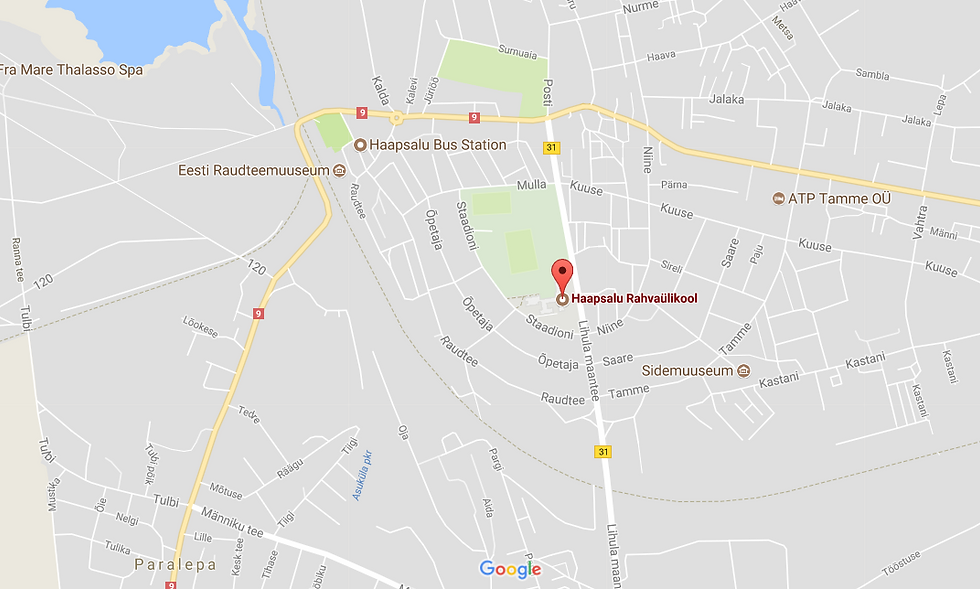Placement Blog post 1: A reluctant assigment
- Sep 28, 2017
- 4 min read
As part of our degree program in the International Masters in Adult Education for Social Change, each semester we must participate in a "placement" portion to our courses. This is an opportunity to engage and work with local organizations working in the field of Adult Education. This placement allows us the opportunity to engage in work that is being done on the ground and helps us further connect theories learned in the classroom with real-life applications.
This semester, we are studying at Tallinn University in Tallinn, Estonia. Prior to being assigned out placements, we had a seminar session in which we articulated what our placements had been like in Malta and in Glasgow previous semesters and where we had the opportunity to write and reflect on what we liked or didn't like about our previous placements and what we would like to see in our placements this semester. In this form and in the seminar, I indicated that I really liked participatory work and that I would prefer to work with first generation college students or with LGBTQIA+ organizations as either of those would contribute to gaining experience in fields I would like to pursue as a career. I also mentioned that I would be open to doing pretty much any placement with the sole exception of being in an English teaching environment. I do not have the skills to teach English as a foreign language and I have been placed in those environments in the past (outside of this IMAESC program) simply because I speak English and they have been very unsuccessful. It is important for an educator to have the tools to be able to explain how and why English is spoken prior to being asked to teach English. I do not have these tools or education. However, several of my classmates in IMAESC do have these tools, education and work experience and have been very successful in teaching English as a second language to non-native speakers (they speak, understand and know the language, grammar and theory of the English language far better than I do).
This made it even more surprising when I found out that my placement would be with Haapsalu Rahvaulikool working with one of their teachers who teaches English as a foreign language. I was pretty upset to find that this was my placement and it was also upsetting to be told that I had been placed there because they "wanted someone with an American accent." Essentially, I had been assigned this placement not because of my skills, knowledge or ability but instead because of how I speak. This is a pretty bad way to start of my placement experience with Tallinn University. However, I have decided to go with it because there aren't any alternative options given to me. So, I will make the best of it and start with some background I have learned about Haapsalu Rahvaulikool. I have a meeting with Mari, the person I will be working with, on Friday, October 6th so hopefully I will get some clarity from this meeting about her expectations and what I can do to help her given my complete lack of experience or training in this subject.

About Haapsalu Rahvaulikool (some of this information was added after the initial writing of this post as I learned more about the school from the people I spoke with and further research):
The school has its roots from the Pastepa People's University which opened in Estonia in 1993 mostly as a result of the country gaining its independence. It was founded by the Estonian Cultural Society and had locations both in Haapsalu and in Noarootsi. In 2002, for funding reasons and because of an encouraged interest in international relations and understanding, specifically with Sweden, the school became Svenska Folkskolan Vanner- or essentially the Swedish Folk High School in Estonia. The main courses offered were centered around Swedish culture and language along with English language programs. They also offered courses similar to those offered in a Swedish Folk High School somewhat altered for an Estonian audience.
In 2009, due to an expanding need for a wider variety of Adult Education courses and a waning connection to Sweden and the Swedish Folk High Schools, the school separated and became Haapsalu Rahvaulikool (which continued to and still has a school also in Tallinn). This was made possible by funding from the EU and also a wider interest in funding Adult Education and Lifelong Learning programs by the Estonian national government. The mission of Haapsalu Rahvaulikool is to, "support the development of individuals, organizations and businesses by creating flexible opportunities for participation in training and courses" and their vision is to, "be a community-based learning community in adult learning, an active, high quality adult education and cultural activities organization."

Because of the 2-year funding rotation of money coming from the EU, the only courses Haapsalu Rahvaulikool offers while I am engaging with them are English language courses; and Estonian language course; a Russian language course; and a Finnish language course. This is because they are currently at the end of a 2-year funding dry-spell. However, starting in January of 2018, they will begin to offer computer and IT courses as well as financial literacy courses and hopefully some other vocational and arts courses. They are able to do this because their EU funding will start a new 2-year cycle in January of 2018 and so they will be able to offer a wider variety of courses for free to adults in the community at least until 2020. The school is currently located inside the same building as Tallina Ulikool Haapsalu Kolledz where they rent rooms and office space.
References:
Heli Kalda, former director of Haapsalu Rahvaulikool
Mari Kald, current English teacher
Haapsalu Rahvaulikool website: http://hru.ee/
Haapsalu Rahvaulikool on Google Maps:




























Comments